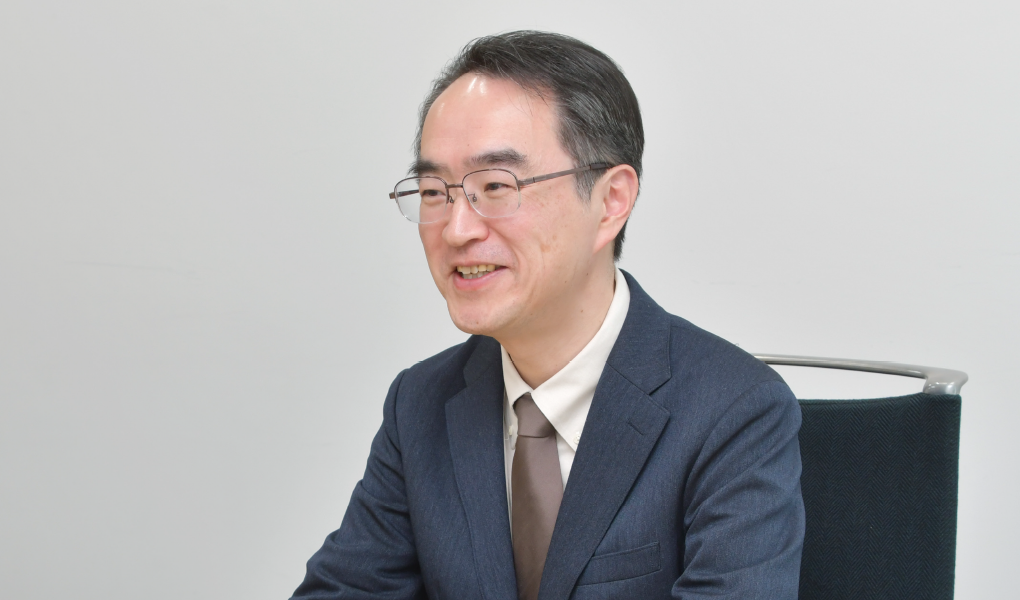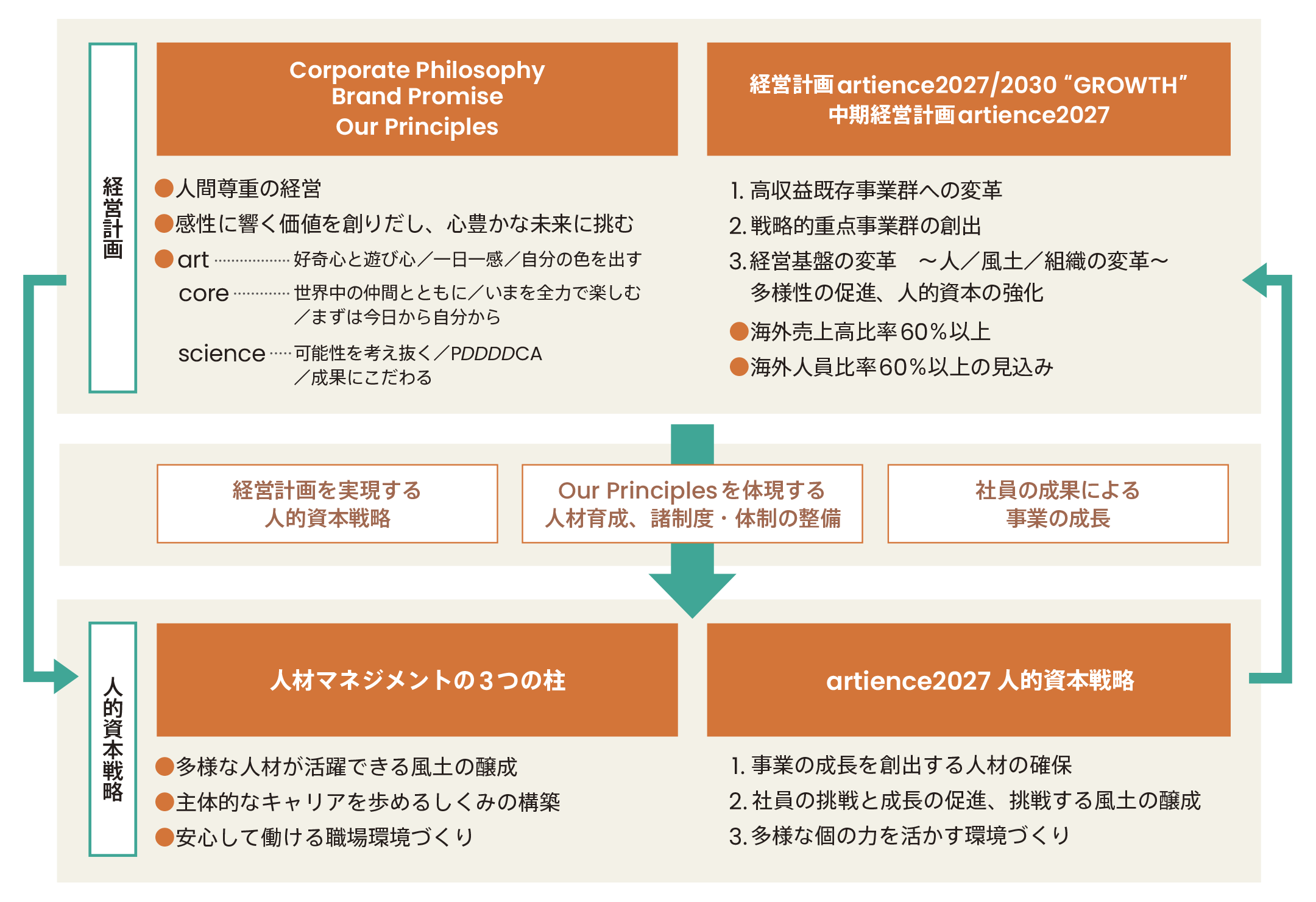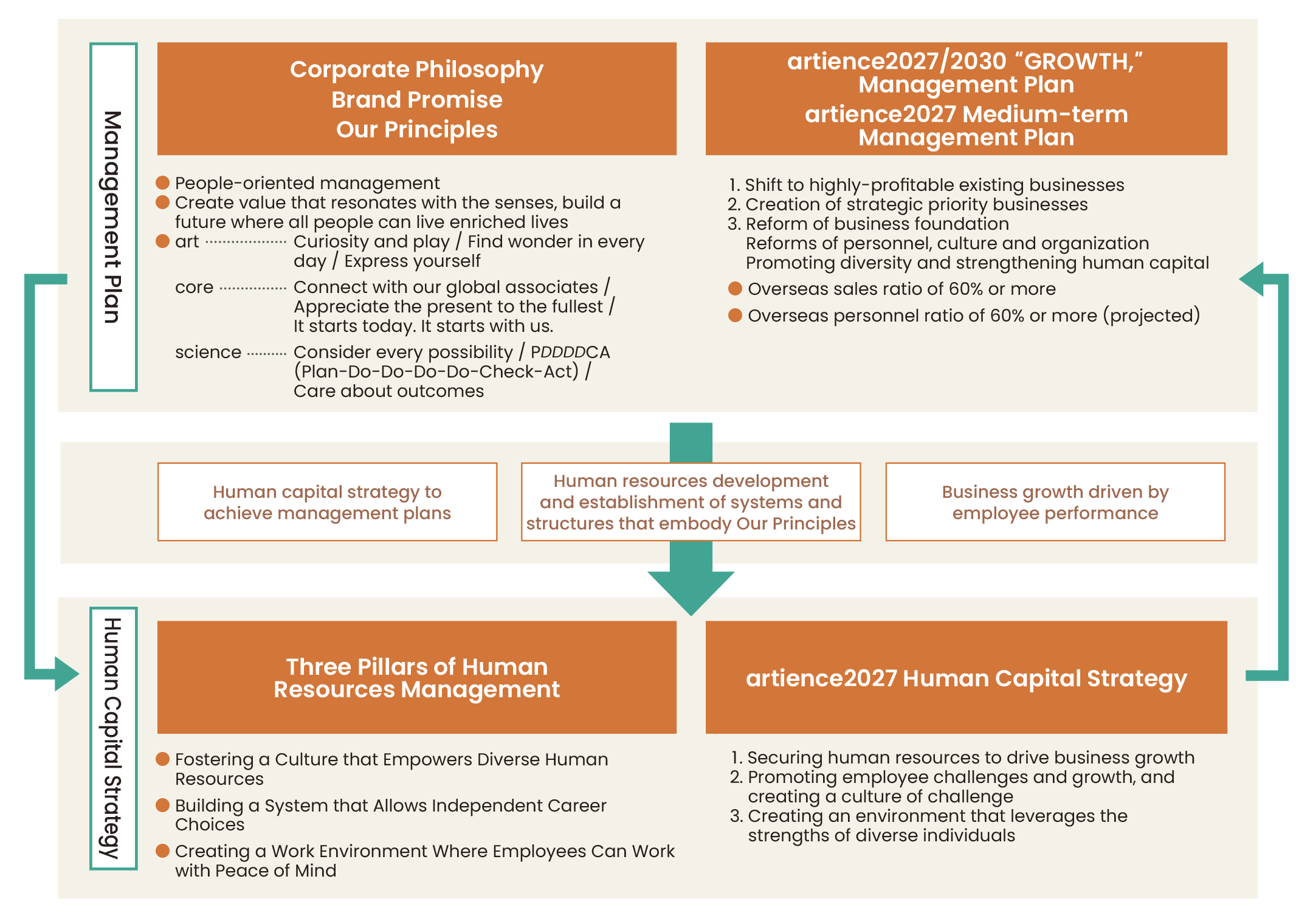artience2027, Medium-term Management Plan | Integrated Report 2025Human Capital Strategy: Maximizing the power of individuals based on People-oriented Management
Published on June 27, 2025
This page has been translated using AI.
People are at the center of all corporate activities at the artience Group. By enabling employees to maximize their own capabilities, we can maximize the corporate value of the entire group. We will continue to pursue the challenge of identifying and maximizing the potential of all employees worldwide.

Junji Sekino
Business planning and human capital are inseparable
At artience, we place people at the center of all corporate activities, and consider them the driving force behind business growth. By bringing out and utilizing the strengths of each and every employee, we aim to enhance the corporate value of our Group as a whole. This is a reflection of our corporate philosophy of People-oriented Management.
The basic policies of the Group’s artience2027, Medium-term Management Plan are the transformation of existing businesses into highly profitable ones, the creation of strategic priority businesses, and the transformation of our management foundation. As we aim for significant transformation under the slogan of “GROWTH,” it is our people — our employees — who will support this effort. Based on our belief that business planning and human capital are inseparable, the human capital strategy of artience2027 focuses on the following three initiatives.
The first initiative is “Securing human resources to drive business growth.” To achieve our business objectives, we will implement talent shifts within the Group through internal recruitment and career challenge programs in strategic priority business areas, including new technological fields such as batteries and semiconductors. It will also be essential for us to acquire human resources from outside the Group, who possess expertise that is not currently available internally. Additionally, we recognize that securing specialist personnel in administrative departments, such as legal affairs, finance, and public relations, and production site staff who support manufacturing on the front lines is a key issue in responding to rapid and drastic environmental changes.
The second initiative is “Promoting employee challenges and growth, and creating a culture of challenge.” We will accelerate human resources development and cultural reform through collaboration with our Incubation Center, which explores new businesses. In FY2024, we launched a new human resources system that emphasizes individual abilities, achievements, and a willingness to take on challenges.
The third initiative is “Creating an environment that leverages the strengths of diverse individuals.” We will work to create an environment in which all employees can thrive, regardless of their background. Gender imbalance among our employees has been a long-standing issue for our company. In our new graduate recruitment for 2025, however, female recruits accounted for 41.2% of new hires. At the same time, the percentage of women in management positions remains low, at 5.8%, so continued efforts are necessary. In addition, with overseas sales accounting for over 50% of our total sales, the utilization of global human resources is also an important key to our success.
“Create value that resonates with the senses and build a future where all people can live enriched lives.” This brand promise is both a commitment to society and a vision that we hold for all our employees. In other words, it encapsulates the message of with what kind of human resources the Group wants to create the future.
Because our workforce is so diverse, it is difficult for everyone to understand and act upon such a philosophy equally. For this reason, the Company has been holding roundtable discussions, in which the president visits various locations to engage in direct dialogue with employees. In FY2024, we held these discussions at 14 locations in Japan and overseas. We also hold workshops for department heads and managers, to enable them to translate our philosophy into departmental policies. Many participants have commented that these workshops provided a valuable opportunity to reevaluate the implementation of higher-level policies in their own departments, and we feel that we have achieved some results in this area. In FY2025, we plan to expand this initiative to our overseas bases.
The background to this revision of the personnel system is to strengthen the link between the Company’s philosophy and management plans. The existing system lacked an adequate mechanism for fairly evaluating employees who took on challenges beyond their daily work. The new system is designed to enable more differentiated treatment based on employees’ attitudes toward challenges and the results they achieve.
In particular, to improve the quality of goal setting, which tended to be very uniform, we held a Goal Setting Improvement Workshop for 217 section chiefs in January and February 2025. The way in which employees approach their work changes depending on the goals that serve as the starting point for their evaluation. Going forward, we will establish a system in which section chiefs, who are close to the front lines, can help their subordinates set effective goals.
The introduction of a system for promoting specialist personnel to management positions is also a major step forward. This has shown that not all employees need to pursue a management or generalist career path. Instead, they can build their careers based on their specialist expertise. We aim for even our youngest employees to feel that the company recognizes and values their specialist expertise.
Overview of the human capital strategy
The artience Group places people at the center of all corporate activities, driving business growth. By enabling each and every employee to perform to the best of their abilities, we maximize the corporate value of the entire Group.


artience2027 Human Capital Strategy, quantitative measurement methods for each initiative
| Human Capital Strategy | Theme | Specific initiatives | Quantitative measurement methods |
|---|---|---|---|
| Securing human resources to drive business growth | Human Capital / DE&I |
|
|
| Promoting employee challenges and growth, and creating a culture of challenge | Human Capital |
|
|
| Creating an environment that leverages the strengths of diverse individuals | Respect for Human Rights / DE&I / Health & Productivity Management |
|
|
Improving engagement
In FY2024, we conducted an engagement survey targeting roughly 3,600 employees, both in Japan and overseas, and received responses from 83% of them. Overall, the results were on par with global manufacturing industry benchmarks in several categories, exceeding the average for Japanese manufacturers. The external agency that conducted the survey also evaluated the results as “healthy” for the first year. The five areas in which we received particularly high ratings were “work-life balance,” “psychological safety,” “good relationships with immediate supervisors,” “trust in the company’s handling of safety,” and “honest communication with outside parties.” On the other hand, issues were highlighted in areas such as “information sharing about the company and businesses,” and “eliminating factors that impair operational efficiency.” We recognize these as areas for improvement going forward.
To improve engagement, we are focusing on two main areas in FY2025. The first area is improvement activities within each department. The survey results showed different trends depending on the department and job type, indicating that there are issues which cannot be addressed with a one-size-fits-all approach. Some departments have already implemented specific improvement measures immediately after the engagement survey. In FY2025, we will share these examples throughout the Company and continue to develop them.
The second area is a group-wide initiative. First, we will hold interactive policy briefings in which department heads will communicate directly with employees to address the issue of “insufficient information sharing with regard to company and business policies,” which was identified in the survey results. By showing the Group’s specific policies and measures, we aim to give employees confidence in the competitiveness of our businesses and organizations. Furthermore, through repeated dialogue, we aim to encourage each employee to combine their own work with the Company’s direction and feel that their daily work is contributing to the development of the entire Group.
Another point we will emphasize is reviewing and eliminating waste in business operations. Section chiefs and Group Leaders who have a deep understanding of frontline operations will take the lead in identifying issues that employees encounter in their daily work, and work to improve operational efficiency.
Furthermore, in order to improve engagement, it will also be essential for us to establish a system that values a spirit of challenge and enthusiasm. We will effectively implement the new personnel system we introduced in FY2024 to evaluate employees’ new efforts and attempts. Under the newly established Retention Committee, the Human Resources Department will take the lead in improving evaluation and compensation.
Because engagement surveys relate to the feelings of employees, there are challenges in quantifying the results and using them as KPIs. Even so, they remain an important tool for hearing employee feedback and understanding the current situation. I would like us to work to understand the qualitative aspects, take the results seriously, and translate them into concrete actions.
Focusing on active roles for global human resources
Activating talent and organization globally is a key theme for artience at present. In FY2024, the number of employees in Japan fell below 3,000, while the number of overseas employees exceeded 5,000 for the first time. We expect this trend to continue in the future. Although the playing field for our business is now clearly centered overseas, Japan-centric thinking in human resources remains a deep-rooted issue. Even in the countries where we operate, our local subsidiaries are often perceived as (small to medium-sized) Japanese-owned foreign companies, and many of their employees lack a strong sense of belonging to the global artience Group.
However, in countries such as Turkey, the United States, China, and Singapore, local employees are taking on leadership roles and achieving positive results. Cross-border cycling of human resources within the Group has also begun. For example, a former CEO in Mexico is now leading a Group company in the United States.
Although artience is a Japanese company, it is no longer limited to just Japanese employees. We must entrust local management to people who can share our philosophy and policies, regardless of ethnicity or nationality. To develop human resources capable of thriving globally, in FY2025 we will run a development program targeting overseas senior management candidates, and conduct training in Japan for current executive-level employees.
In FY2024, we also established the Global Support Unit (GSU,) to strengthen human resources support for overseas subsidiaries. GSU supports overseas bases from various perspectives, with a primary focus on human resources, but also including legal affairs and general affairs. Going forward, we plan to focus on missions such as global talent development and cross-border mobility.
Maximizing the potential of all employees both in Japan and overseas
Going forward, I believe that our mission in HR will continue to be embodying the Group’s philosophy of “People-oriented Management.” This term can be interpreted in various ways, but I interpret it as “creating an environment in which each and every employee can make maximum effective use of their abilities.” To achieve this, we will make efforts in all areas, including understanding, assigning, developing, evaluating, and compensating our employees, and ensure that these areas are organically linked.
So far, we have established a solid foundation within Japan. The most critical challenge moving forward will be instilling a sense of belonging as part of the artience Group among our growing overseas workforce, which now exceeds 5,000 employees, and expanding their opportunities to contribute. We need to show a clear path forward for developing human resources who can share our philosophy and aim for growth together across borders.
As the Human Resources Department, we will continue to pursue the challenge of identifying and maximizing the potential of all employees worldwide.
